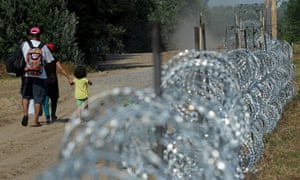by DOMINIQUE BAUER, DANIELA PAREDES, and KRISTINE KROYER
 A family walks by a fence that is being built on the Hungarian Serbian border at Morahalom, Hungary. ‘The leaders of Serbia, Macedonia, Germany now accept that trying to blockade their borders is futile. The rest of Europe must face the facts too,’ writes Simon Cox. PHOTO/Reuters/The Guardian
A family walks by a fence that is being built on the Hungarian Serbian border at Morahalom, Hungary. ‘The leaders of Serbia, Macedonia, Germany now accept that trying to blockade their borders is futile. The rest of Europe must face the facts too,’ writes Simon Cox. PHOTO/Reuters/The Guardian
In Hungary, a fence has been built. One day before the opening of the second meeting of the Regional Academy on the United Nations (RAUN) in Szeged, a city located close to the Hungarian-Serbian Border, the fence had been completed and the border de facto closed. Two additional fences have been announced, and state leaders continue to open and close borders hourly. Röszke, a small town between Szeged and the border, became the main stage upon which Europe would witness the refugee tragedy. Thousands of refugees: women, men, children, young and old, mostly fleeing the Syrian crisis, flocked to Europe’s gates. The doors opened, only to be promptly slammed in their faces. On September 14th, an emergency meeting of European Interior Ministers resulted in no consensus –not even a joint public statement. On September 22nd, the second interior ministers met and agreed to draft the planning of a quota system to relocate 120,000 refugees. The insufficiency, and probable inefficiency, of this system, along with the resistance of state leaders from Romania, Slovakia, Hungary, and the Czech Republic, is no match for the gravity of the escalating crisis.
In the meantime, however, European civil society seems to have reached a general consensus: “refugees are welcome”. International press coverage has brought to our attention initiatives, mostly in Austria and Germany (key passages and destination countries in this improvised, ever-changing emergency response), where Europeans greet refugees at train stations, welcome children with toys and blankets. People high-five refugees upon arrival, sing to welcome them and assist them in a variety of ways, ranging from addressing their basic needs to knitting hats and scarves with and for refugees at train stations. Just as the state orders to block refugees from crossing the border proceeded swiftly and effectively, engaged individuals and groups have swiftly and effectively organised to relocate the refugees. The Vienna-based organisation SOS Röszke (in the meantime renamed SOSkonvoi) has been assisting with the provision of basic needs and support on the Hungarian side of the border for the past 2 weeks, as informed by one of our team members, Nicholas Lieb, who has been actively volunteering with the organization.
Alternatives International Journal for more
(Thanks to Feroz Mehdi)